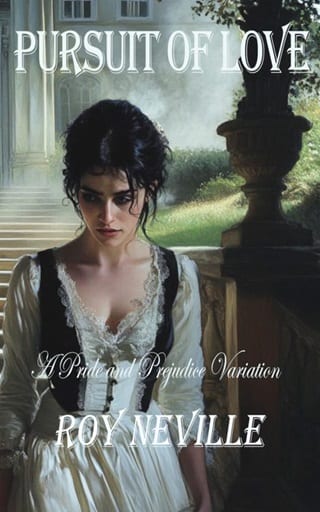Chapter 15
D ear Miss Elizabeth
Elizabeth paused, savouring the word ‘dear’, which had been conspicuously absent from either his initial letter or hers.
‘It is merely the opening of a letter’, her father would certainly tell her in his jesting tone, though she could not help but imagine Mr Darcy writing that particular word, which seemed to be penned more tightly than the rest.
Being addressed as ‘Elizabeth’ also caused a flight of butterflies to flutter wildly in her stomach, igniting an insatiable urge to dance.
‘You are Miss Elizabeth when Jane is with you’, her father would continue with a hint of wry amusement. Yet she cared not a whit—in her dreams, he always called her ‘Elizabeth’ .
I appreciate your response to my letter and the explanations you proffered, which I earnestly needed. We both indeed made mistakes. Yet you have placed me in a strange situation, wherein I find myself failing to appreciate the very trait I hold most dear in my character—my honesty.
Nevertheless, it would be prudent for me to reconsider my manner of speaking to those around me and effect adjustments when necessary. I also concede that superficial observations can lead to substantial misconceptions about an individual.
I place my trust in you and am prepared to accept my error regarding your sister’s sentiments and intentions. But I can only encourage Bingley to scrutinise his own feelings and intentions towards Miss Bennet and decide accordingly. This does not necessarily require an immediate journey to Hertfordshire; rather, it implies acting without regard to the opinions of others and following the dictates of his heart and mind. The responsibility of disclosing this matter to your sister rests with you.
Your presence has endeared you to my family, and both Mrs Barstow and Georgiana have expressed their wishes for your well-being, daring to hope we shall all meet again.
Yours sincerely,
Fitzwilliam Darcy
???
“Do you want me to be utterly candid?” Mary asked, her voice trembling with a mixture of astonishment and joy as Elizabeth asked for her opinion about the second letter received from Mr Darcy.
“Yes,” replied Elizabeth, longing for someone’s insight as she realised that a reply from her aunt would necessitate an entire day’s wait. She had already written to Mrs Barstow and Mrs Gardiner, yet an immediate response was what she yearned for, surprising even herself with the intensity of her eagerness. Mary seemed the natural choice as her confidante, as Elizabeth had decided not to tell Jane anything about Mr Darcy’s intention to speak to Mr Bingley.
“It is an amicable missive,” Mary said.
“Amicable?” Elizabeth asked, somewhat disappointed.
“You asked for my sincere opinion,” Mary reminded her gently.
“Yes, yes,” Elizabeth urged. “Please, continue.”
“A sensitive and honest letter—”
“Not a love letter,” Elizabeth concluded.
“Indeed,” Mary murmured, her thoughts perhaps dwelling on the possibility that her burgeoning relationship with Elizabeth might suffer if she failed to discover love within the message.
“Yes, you are correct,” Elizabeth conceded.
“Will you tell Jane of this?”
“No, I believe it may be wiser not to tell her. If Mr Bingley should reconsider his decision and journey to Hertfordshire, they will resolve their affairs together. On the other hand, this letter fails to provide a definitive answer for her. I have already told her that Mr Darcy never said Mr Bingley loved her. Instead, in his first letter, he wrote about his friend’s propensity for falling in love—a circumstance not necessarily in Mr Bingley’s favour. Then he wrote that Mr Bingley preferred Jane to any other lady in the country, and that his partiality for her was beyond what he had ever witnessed in him. How would you interpret this?”
“It appears to me that Mr Bingley is a man who enjoys toying with the affections of ladies yet bolts when the game becomes too…ardent?” Mary ventured, surprising Elizabeth with her astute interpretation that aligned closely with her own ideas. In the intimacy of their family, where Mary had no need to prove herself, she displayed a remarkable wit and capacity to express her ideas clearly. It was a lamentable truth that she often lost this aplomb and precision in public.
“On the other hand, Jane’s sentiments did not appear too ardent last autumn,” Elizabeth mused aloud. “Yet we cannot be certain how she conducted herself in his presence. She sustains that she demonstrated her affection.”
“In that case, it seems this gentleman is nothing more than a philanderer!” Mary said with evident anger yet content to discuss Jane and not Mr Darcy’s letter, which bore no traces of ardent sentiment.
???
My dear,
Mrs Barstow wrote.
It is indeed a step forwards to receive a response to your letter andhear that you accept that you share the guilt of that missed opportunity. Fitzwilliam has a most obstinate disposition and does things only in his own way. Yet it appears, on this occasion, your influence has led him to change. It is a development I find rather pleasing.
However, I have more delightful tidings than those contained within his letter.
We have received an invitation to the annual ball hosted by the Earl of Charlcombe at his splendid residence in Bath. Remembering that your aunt mentioned your impending journey to Bath, I visited her and arranged for your presence there to coincide with the date of this grand ball. With the assistance of Lady Matlock, who shares my fears regarding an alliance between Fitzwilliam and Lady Amelia, I have secured invitations for you and the Gardiners to participate in this magnificent event.
Prepare yourself, my dear, for you will be the sensation of the ball. It unfailingly occurs when a captivating stranger, such as you, appears in a circle where everyone else knows each other well. Fitzwilliam will be both enchanted and, I daresay, somewhat jealous of your success and ask you to dance three times in a row—I am confident!
Yours affectionately,
Diana Barstow
 Fullepub
Fullepub 



